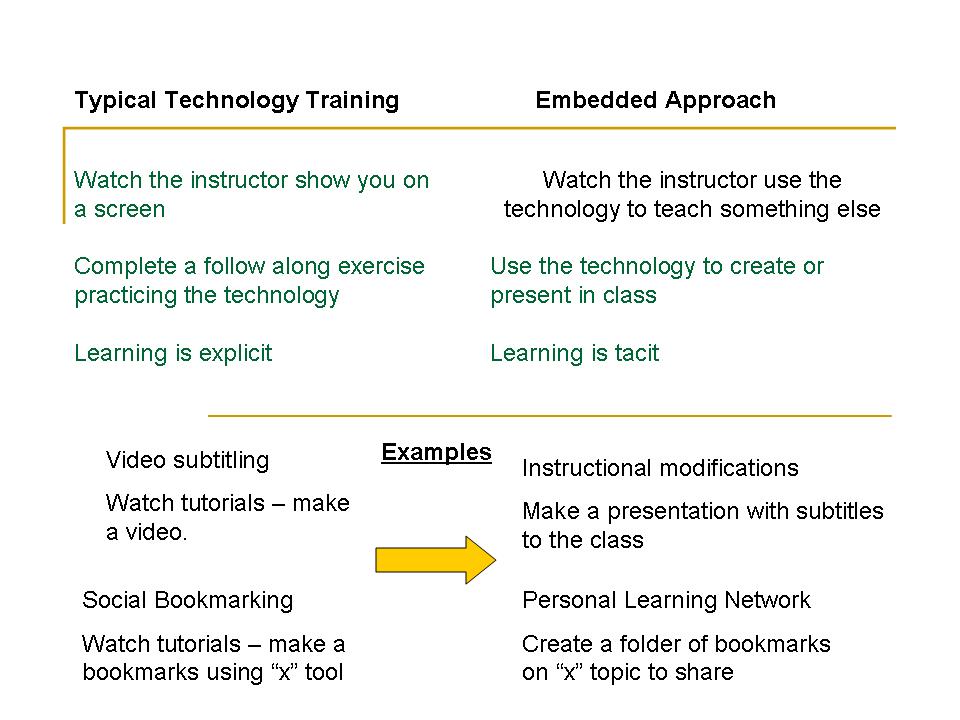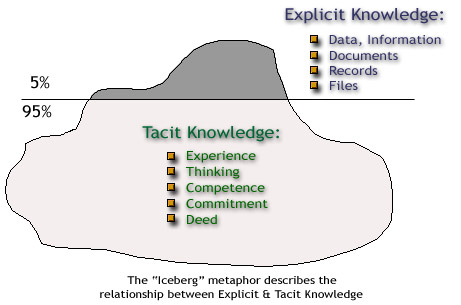Focal vs Tacit knowledge
Technology. Everyone wants to learn it and everyone wants the “key” that might open up the door to these skills.
Truth is, there is no easy way! I’ve been mucking about and learning as I go – for a long time. And that’s what I love about technology and education. I can learn by riding my waves of motivation – surfing toward possibility. There is so much damn possibility! However, how best can you learn to get up on the surfboard and feel the power and freedom of that wave? How?
Well, most teachers learn by doing and trying and struggling. I do think there is an easier way – you can benefit from a course. However, IMHO and from my own experience being wrong – most technology courses are given in the wrong manner.
I was prompted to think about this after commenting on Jeremy Harmer’s blog post about technology and by default, his own efforts to learn an audio recording program. I commented that I thought despite how most training programs work – that an embedded approach is the best way to “teach” technology.
What do I mean? Well, as the above tweet so nicely relates, it is about making technology the servant, the means and not the king or product. Technology should be taught in the process of teaching other things – it should not be the focus. Programs are ill effective when they take the, “Let’s learn how to do subtitles” approach.
I’ve been there, I’ve done it and it effects little change in teachers. They get a nice little diploma, maybe a pay raise, maybe a confidence boost but that’s mostly it (except for those spark plugs and you don’t ever teach them – they’d learn even if exiled on the moon). Why do I think this direct, technology course approach is ineffective? Because we learn by doing but even more so with technology through “purposeful” doing.
One thinker extraordinaire is Michael Polyani (the lesser known of a family of thinkers and of many amazing Hungarian intellectuals of his era). I read him extensively while in university, especially his “Personal Knowledge“. To me, he is brilliant in his explanation and support of “tacit knowledge” over explicit or what he called, “focal knowledge”. As he famously said, “We can know more than we can tell.” This speaks volumes for both language trainers and teachers.
Focal or explicit knowledge (or Polyani would say, “knowing” for knowledge is never a static phenomena) is something we are directly attending to. We can count it and define it and share it. Tacit knowledge is an ability or skill to solve a problem based on one’s own problems and concerns. It is very difficult to show another person or “transfer”. Both have a place but some things (like skills, like technology) are not very well transferred by way of explicit knowing. You must learn it indirectly. [and please note, I’m massacring Polyani’s subtle thought – he’d never so brutally divide these two ways of knowing…]
To explain by way of a good metaphor, let’s think of an apprentice. An apprentice might go to school but more often than not, he/she observes, tries, imitates, practices. They don’t follow strict steps or listen to someone tell them how to lathe a 3/8 inch pipe. They do it but most importantly, they do it as an actual, real and personal thing. Not just for the sake of learning….. They don’t think, “Wow, I’m learning how to lathe a pipe!” What they are thinking is, “this will work well and fit perfectly”.
It is kind of like looped feedback. You model the technology in use and teachers learn by seeing it in use as it should be and then using it not in and of its own sake but for an outcome that is non technology related. You see, we never use technology in order to use technology (or few of us do, maybe those unfortunates showing off their latest ipad while doing squat). We learn technology by using it as a means to something else.
Let me give a practical example. Take the usual course on “Moodle” . You go there and learn and practice tutorials on how everything works. Then maybe you do a final project to show how brilliantly you can “do” moodle. My way is completely different. You don’t take a course in moodle. You’d say take a course in curriculum development and learn moodle as you learn about curriculum development and develop your online syllabus. Two different animals. You learn tacitly. You make it personal.
In my own teacher training classes, I have got trainees using technology to produce learning outcomes that aren’t technology related. That’s the way to go. And of course, I got many teachers saying, I can’t do that! However, they always managed – LOL! And that’s how we learn, we struggle and we try but not in the name of technological competence but in the attempt to do something else, communicate something else. Technology is a means, not an end.
Let me list a few more examples of how this would work (and will work in my new TESOL certificate course).
I’d love to know what you others think about learning technology through a course which isn’t “about” technology? Also, shouldn’t we be hiring teacher trainers that are good with technology – that can model it in every day class instruction, so teachers can learn it indirectly, tacitly?













Well put, David! Even when I’ve taken a course designed to teach a specific technology, I’ve found my retention is only as effective as the personal investment I have in the project I am creating. I’ve had effective experiences in both desktop publishing (mid 1990’s) and dreamweaver courses, because I was personally invested in my projects.
On the other hand, I took a beginning course in Photoshop and although I enjoyed it, I retained very little. What I did get was familiar enough with the program so that I can find my way around it, sort of… better than I would have done studying the program on my own, with no particular project in mind.
There are pitfalls to the ‘learning technology as it applies to your teaching (or publshing, or business) project… we get ‘holes’ in our general knowledge with this method… and sometimes stuck doing things in an inefficient way, that we’ve self taught in a desperation to make something work… but I’ve never gotten as DEEP a knowledge from a survey type technology course- not even close. I guess there’s room for both. I am thankful I took the Photoshop class, or I wouldn’t be able to do anything beyond crop and the image adjustments menu… but still, I would have to be personally motivated to do much more. I just know more what is possible/ available, if I had the inclination to do it.
And what I loved, LOVED about my teacher training program (master’s) is it was so hands on- EVERYTHING we learned we were also applying directly and immediately to real students in real classrooms. I thrived in that learning environment.
Ellen,
Thanks for the examples and they shed light on this and show clearly that for the most part – learning technology through a personal |”purpose” and end and project, is much more valuable than just learning it as an add on skill.
Polyani fascinates me. I was terribly into his ideas 20 years ago and must admit, I only remmember/know half of what I experienced as a 25 year old reading for hours crouched down in the aisle of books in the library 7th floor. A few times, almost locked in as the lights went out and I was still there.
Still, seems like the easiest way gets the grease. I see so many, “learn how to use powerpoint” or “learn how to subtitle videos” courses…. or “learn the web 2.0 way”. I guess it is human nature. But like student centered classrooms, we really need purpose centered courses….
I hope to launch a course soon that is a project course – construct a portfolio of 10 items using recommended tools. The focus not the technology and explaining it but the outcome/the product. You’ll be the first to get a free invite!
David